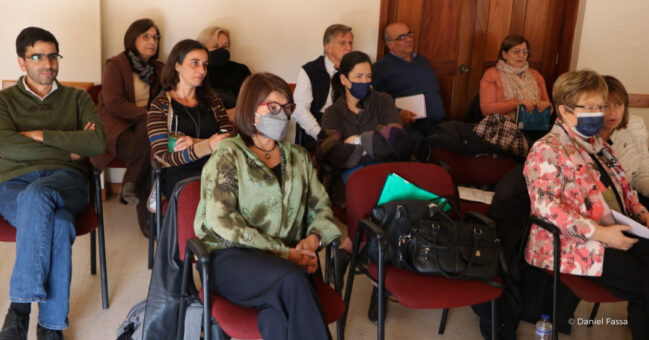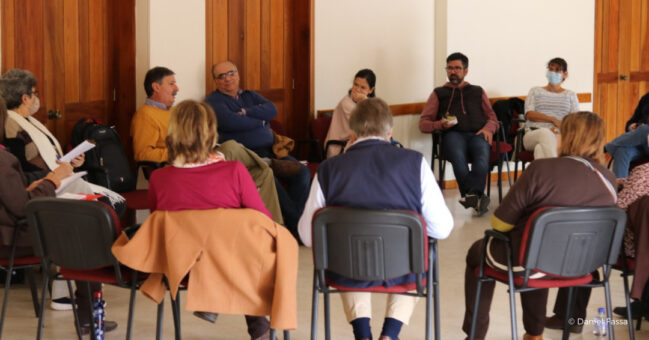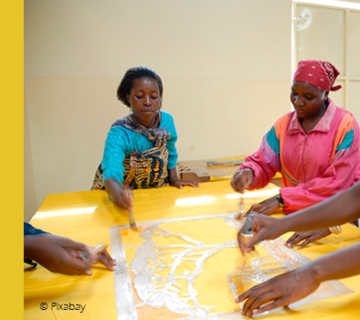Expanding horizons of learning. From 27 March to 2 April in Colombia a meeting on “University, knowledge and wisdom: a perspective for Latin America”. A seat in Latin America for Sophia UI.
Openness and graduality. These were the guiding principles of the meeting “University, knowledge and wisdom: a perspective for Latin America”, held at Tocancipá, Colombia from March 27 to April 2. It brought together Giuseppe Argiolas, Rector of the Sophia University Institute, with the members of a multi-disciplinary intercultural commission which over the past ten years has been working to build the foundations for a Latin American seat of the university. The General Council of the international Focolare Movement was represented by Francisco Canzani and Renata Simon.
 At the heart of their considerations were the guidelines from the Congregation for Catholic Education for the development of a project unprecedented in the history of pontifical universitities. Namely, that the individual units of the Sophia University Institute, even if situated in different continents, can be considered part of a single global university, with its headquarters based at Loppiano, near Florence, Italy.
At the heart of their considerations were the guidelines from the Congregation for Catholic Education for the development of a project unprecedented in the history of pontifical universitities. Namely, that the individual units of the Sophia University Institute, even if situated in different continents, can be considered part of a single global university, with its headquarters based at Loppiano, near Florence, Italy.
If approved, the Sophia ALC (Latin America and Caribbean) project will be the first step in the formation of this “university network”, with three geographical branches. In Argentina a proposed Master in “Integral Ecology and Interculturalism” delivered in hybrid modality (in person and online); in Brazil a degree course in “Education directed towards Integral Human Development”; in Mexico university extension courses, available mainly online.
 Over the six day meeting, the commission members concentrated on forming strategies for the gradual implementation of this complex project in all its aspects, including conforming to ecclesial norms as well as to local legislation, economic sustainability, fundraising and publicity, infrastructure and curriculum development.
Over the six day meeting, the commission members concentrated on forming strategies for the gradual implementation of this complex project in all its aspects, including conforming to ecclesial norms as well as to local legislation, economic sustainability, fundraising and publicity, infrastructure and curriculum development.
The result was a growing certainty that the moment has arrived to extend even further the horizons of “unity in diversity” experienced by the Sophia ALC team members, who come from Argentina, Brazil, Colombia, Costa Rica, Mexico and Uruguay, and from academic disciplines as diverse as administration, communications, economics, education, history, law, philosophy, sociology and theology. It is clear that the future of the project will depend on a continuing and deepening dialogue between the rector and academic staff of Sophia, the Focolare Movement leadership team, and above all with the Congregation for Catholic Education to indicate the channels along which this dream of Chiara Lubich can be gradually brought to fruition, in this case in the Latin American continent.
Daniel Fassa


 Italiano
Italiano Español
Español Français
Français Português
Português




C’est formidable ! Quelle chance pour les jeunes de l’Amérique Latine…
C’est intéréssant l’idéal.
Hola! Tienen contemplado otras carreras para cursar en U. Sophia? Sería muy buena opción. Gracias. Uno.
Per favore visita il sito web https://www.sophiauniversity.org/it/
Visite https://www.sophiauniversity.org/it/
Excelente y conmovedor este proyecto de Sophia Latinoamericana. Sueño de Chiara Lubich para realizar este proyecto de Unidad en la Diversidad. Mis oraciones y mi Unidad para que esté sueño pueda concretizarse.
Con Jesús en medio y en unidad todo se puede lograr. Es una belleza
Parabéns a todos os envolvidos nesse belo e entusiasmante projeto! Sigo unido, pedindo ao Espírito Santo que conceda a vocês Seus Dons, especialmente Sabedoria e Ciência!
Bel traguardo